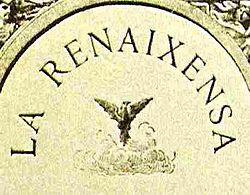|
Renaixença
The Renaixença (Catalan pronunciation: [rənəˈʃɛnsə]; also written Renaixensa before spelling standardisation), or Catalan Renaissance, was a romantic revivalist movement in Catalan language and culture through the mid 19th century, akin to the Galician Rexurdimento or the Occitan Félibrige movements. The movement began in the 1830s and lasted until the 1880s, when it branched out into other cultural movements. Even though it primarily followed a romantic impulse, it incorporated stylistic and philosophical elements of other 19th century movements such as Naturalism or Symbolism. The name does not indicate a particular style, but rather the cultural circumstances in which it bloomed. OverviewAlong with the later modernisme, this movement ended a period of Catalan cultural decline commonly known as Decadència, that dated back at least to defeat in the War of the Spanish Succession (1701–1714)[2] and the subsequent Nueva Planta decrees, which suppressed Catalonia's traditional institutions, privileges, and furs beginning January 16, 1716. Thus, the aim of this movement was the full restoration of Catalan as a language of culture, not only through the promotion of various forms of art, theatre and literature in this language, but also attempting to establish a normative standard for the language, something however not fully accomplished until the first quarter of the 20th century. As with most of the other Romantic movements, it was noted for its admiration of the Middle Ages, which was often reflected in art, and in Barcelona, the literary contest known as Jocs Florals or Jocs de la Gaia Ciència was revived. The Renaixença occurred not only in Catalonia proper, but also in other Catalan-speaking regions such as the Balearic Islands.[3] A journal particularly associated with the movement was the magazine La Renaixença, from which the name was taken[citation needed]- originally spelt Renaixensa before the Fabrian spelling reform. Notable individuals related to Renaixença
Notes
Further reading
External links
|
